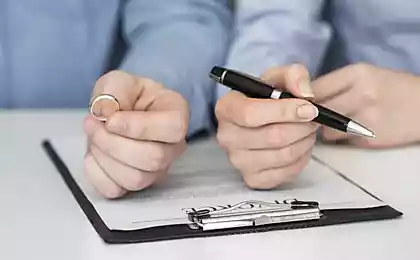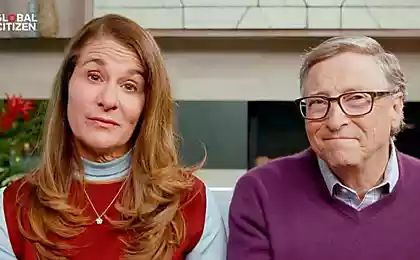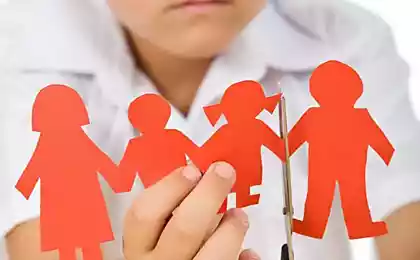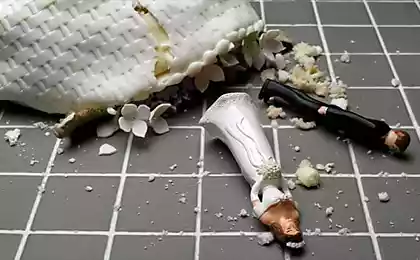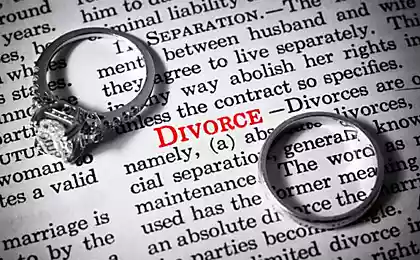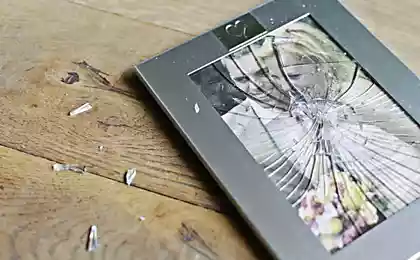516
How to talk to kids about divorce
"Take their responsibility and give the responsibility of others — others"
If you have someone shared children, you with this person forever relatives from the other end. Nezavisimo, from the fact, whether you like the idea or not, you broke up with him or living together, you are as equal initiators of the events of the birth of your child and your family ties spelled out in his genealogical map.
It attempts to play "mother-heroine" or only being a good parent, are a great danger to the psyche of the child, bringing her split.
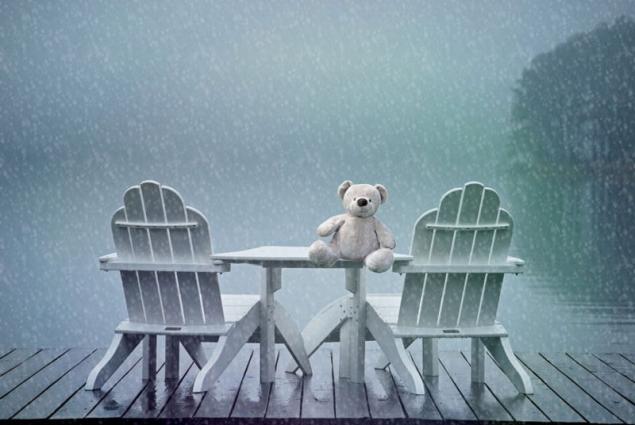
In our peacetime, the parent of heroism, inspired by anxiety for their child, elevates parents on a pedestal in the eyes of your own children, but sends the children of the war, background of anxiety and uncertainty for their future.
The mother (usually the mother is in this situation, at least the father) can greatly overdone in taking full responsibility for the fact of divorce and... and straining. Or psychologically overwhelm the child, imposing their own unilateral vision of this unpleasant situation for her.
The lie of the parent in this matter, as well as the position of "I'll tell you everything", form the conditions of alienation or neurosis, where it would be possible not only to avoid but also to create a situation of empathy, trust and emotional intimacy with your child.
What to do? How to answer the child questions about the missing in his life the second parent.
1.Answer the question asked by the child, briefly and slowly.
The child may, to your surprise, you quickly settle for direct short-answer and go play again.
If the answer will seem to the child is insufficient, he asks the second question and you will be able to answer it and at the same time to understand that for his age he wants to know and what information may be, yet sufficient.
So you don't overload it, for him, irrelevant details and avoid their own misguided efforts to report "everything at once" – position – "so he finally said I got to tell him "all" to quickly close this topic and never again to her not to return" – will not work.
Questions child's maturing as he's growing, and it will come back to this, but only depends on you will bring you is with him or away.
On the question of the child "where's my dad?" if the child needs an answer is about "where?". He does not need, at this moment, the answer to the question "what's my dad?" or "how could he...". Be careful, asking "where's dad?" the child might not be ready to digest your information about "what's my daddy?". He may not ask today, as the mother justifies or explains the actions of his dad.
2. Inform the child, in the first place the facts from your timeline of your interaction with his father(mother). In the spirit: studied, got married, rode, broke, interested, sends, writes.
Not your evaluation story, the baby needs in the first place, and the facts. Believe me, your child, if he has already grown to that question, he is able to lay down their opinions based on the facts and share their opinions with you. This situation may be opportune for you to the child, get to know each other and feel that not only you, but your support, moral support and sensible idea about life.
3. Stress by answering the following question "why" and reasoning about the facts of your separation, that is your own perception of events, and he (your child) and his father can see these circumstances as something in its own way.
So you will be able to share the responsibility for the events of your life, not only with the other parent and with child. This position gives the children extra motivation to self-confidence. After all, he, even now the little man allows, as an adult, to speculate and to lay down their opinions, which means he has the right to choose how to treat the events of his life. For this, he, when grown up, will say "thank you". Say "thank you" for what you do not impose your feelings and assessment about important life events. So he will learn to respect, appreciate and thank: you, myself, and other people involved in key events of his life.
Besides, being able to separate the actions from the assessment of the person who made them, you will be able to stay on the lines of respect and with the estranged parent, who on his own, led him the reason is not with you now.
This respect for the missing parent is the basis of the integrity of the psyche of your child. Otherwise, if you can't keep respect for your partner in parenthood, don't be surprised that your child is "as if deliberately, so you get" shows you the worst in the rejected parent. This is the law of integrity of the system: there is nothing that could be withdrawn from the system, without compromising it.
Remember, if you have someone shared children, you with this person forever relatives from the other end, whether you split up or live together.
If you have not passed the lesson of acceptance with your partner (father/mother of the child), and drove this "unknown" person with his "strange behavior" of your life, you your child these lessons will return, as it were, with the subtext — "dad you've taken, and my mother, where you go?"
So you still have to learn how to build relationships with what you thought you would be avoided.
4. Ask your child what he would have done himself, in your place, or what should do now.
If the child has a desire: to call, to write, to see, do it. And accept any result. And even here, as if you do not find it difficult, divide the responsibility for what happens for three: you, the child and the other parent.
Children, establishing lines of communication with the other parent and his reaction to what is happening are three different processes.
And for God's sake, stop to consider himself a God! Don't try to take responsibility for "all", mixing all the parts of the process in one and closing them myself.
Perhaps this strategy: assume that you are the only one who knows "how things should be" – and was the reason for your breakup.
What to do.
1. Do not lie and accuse.
"Heroic" parent, the one who alone is raising a child may sincerely think that he is entitled to pofantaziruete about how it was "really" to do as he thinks best for the child. But there is a folk saying – "trying our best, it turns out as always". Its meaning is that what is the Brightener only considered bad, because he thought his "mistakes" and now, he's trying to do what's best, for he is guided by the idea "to continue not to harm."
A particle of speech "not" is not perceived by our emotional intelligence. Remains in the focus of our attention from the words "do no harm" to "harm." You know, you are thinking the thought "do no harm", is a background wave of danger. The space begins to be impregnated with a variety of thoughts about harm. So instead of desirable "best way", it turns the ordinary and typical in tune with your perception of reality – "as always".
If the source of your actions – fear and mistrust, and the result will be impregnated with these emotions and attitudes. There is no other way, as our results of life come from our internal motives.
Assume that your version about "good" for another, may not be the best scenario. Even if we are talking about your own child, remember that he is a separate person.
Often let the idea that the world is wiser.
To help you will be aware of the fact that, without close monitoring, your baby has formed the nature of a healthy baby, inside the mother's womb and the same force that created it there, and is now in his life – it is immeasurably older and wiser than any of your reasoning, so you should share the responsibility for his well-being with her too. No matter how clever and exemplary person you are, you are not entitled to deprive her own child of contact with his fate.
Trust, the basis of the human capacity for happiness, cultivate it and happiness in your life will be more. published
Author: Natalia Walicka
P. S. And remember, only by changing their consumption — together we change the world! ©
Join us in Facebook , Vkontakte, Odnoklassniki
Source: valitskaya.com/wp/
If you have someone shared children, you with this person forever relatives from the other end. Nezavisimo, from the fact, whether you like the idea or not, you broke up with him or living together, you are as equal initiators of the events of the birth of your child and your family ties spelled out in his genealogical map.
It attempts to play "mother-heroine" or only being a good parent, are a great danger to the psyche of the child, bringing her split.

In our peacetime, the parent of heroism, inspired by anxiety for their child, elevates parents on a pedestal in the eyes of your own children, but sends the children of the war, background of anxiety and uncertainty for their future.
The mother (usually the mother is in this situation, at least the father) can greatly overdone in taking full responsibility for the fact of divorce and... and straining. Or psychologically overwhelm the child, imposing their own unilateral vision of this unpleasant situation for her.
The lie of the parent in this matter, as well as the position of "I'll tell you everything", form the conditions of alienation or neurosis, where it would be possible not only to avoid but also to create a situation of empathy, trust and emotional intimacy with your child.
What to do? How to answer the child questions about the missing in his life the second parent.
1.Answer the question asked by the child, briefly and slowly.
The child may, to your surprise, you quickly settle for direct short-answer and go play again.
If the answer will seem to the child is insufficient, he asks the second question and you will be able to answer it and at the same time to understand that for his age he wants to know and what information may be, yet sufficient.
So you don't overload it, for him, irrelevant details and avoid their own misguided efforts to report "everything at once" – position – "so he finally said I got to tell him "all" to quickly close this topic and never again to her not to return" – will not work.
Questions child's maturing as he's growing, and it will come back to this, but only depends on you will bring you is with him or away.
On the question of the child "where's my dad?" if the child needs an answer is about "where?". He does not need, at this moment, the answer to the question "what's my dad?" or "how could he...". Be careful, asking "where's dad?" the child might not be ready to digest your information about "what's my daddy?". He may not ask today, as the mother justifies or explains the actions of his dad.
2. Inform the child, in the first place the facts from your timeline of your interaction with his father(mother). In the spirit: studied, got married, rode, broke, interested, sends, writes.
Not your evaluation story, the baby needs in the first place, and the facts. Believe me, your child, if he has already grown to that question, he is able to lay down their opinions based on the facts and share their opinions with you. This situation may be opportune for you to the child, get to know each other and feel that not only you, but your support, moral support and sensible idea about life.
3. Stress by answering the following question "why" and reasoning about the facts of your separation, that is your own perception of events, and he (your child) and his father can see these circumstances as something in its own way.
So you will be able to share the responsibility for the events of your life, not only with the other parent and with child. This position gives the children extra motivation to self-confidence. After all, he, even now the little man allows, as an adult, to speculate and to lay down their opinions, which means he has the right to choose how to treat the events of his life. For this, he, when grown up, will say "thank you". Say "thank you" for what you do not impose your feelings and assessment about important life events. So he will learn to respect, appreciate and thank: you, myself, and other people involved in key events of his life.
Besides, being able to separate the actions from the assessment of the person who made them, you will be able to stay on the lines of respect and with the estranged parent, who on his own, led him the reason is not with you now.
This respect for the missing parent is the basis of the integrity of the psyche of your child. Otherwise, if you can't keep respect for your partner in parenthood, don't be surprised that your child is "as if deliberately, so you get" shows you the worst in the rejected parent. This is the law of integrity of the system: there is nothing that could be withdrawn from the system, without compromising it.
Remember, if you have someone shared children, you with this person forever relatives from the other end, whether you split up or live together.
If you have not passed the lesson of acceptance with your partner (father/mother of the child), and drove this "unknown" person with his "strange behavior" of your life, you your child these lessons will return, as it were, with the subtext — "dad you've taken, and my mother, where you go?"
So you still have to learn how to build relationships with what you thought you would be avoided.
4. Ask your child what he would have done himself, in your place, or what should do now.
If the child has a desire: to call, to write, to see, do it. And accept any result. And even here, as if you do not find it difficult, divide the responsibility for what happens for three: you, the child and the other parent.
Children, establishing lines of communication with the other parent and his reaction to what is happening are three different processes.
And for God's sake, stop to consider himself a God! Don't try to take responsibility for "all", mixing all the parts of the process in one and closing them myself.
Perhaps this strategy: assume that you are the only one who knows "how things should be" – and was the reason for your breakup.
What to do.
1. Do not lie and accuse.
"Heroic" parent, the one who alone is raising a child may sincerely think that he is entitled to pofantaziruete about how it was "really" to do as he thinks best for the child. But there is a folk saying – "trying our best, it turns out as always". Its meaning is that what is the Brightener only considered bad, because he thought his "mistakes" and now, he's trying to do what's best, for he is guided by the idea "to continue not to harm."
A particle of speech "not" is not perceived by our emotional intelligence. Remains in the focus of our attention from the words "do no harm" to "harm." You know, you are thinking the thought "do no harm", is a background wave of danger. The space begins to be impregnated with a variety of thoughts about harm. So instead of desirable "best way", it turns the ordinary and typical in tune with your perception of reality – "as always".
If the source of your actions – fear and mistrust, and the result will be impregnated with these emotions and attitudes. There is no other way, as our results of life come from our internal motives.
Assume that your version about "good" for another, may not be the best scenario. Even if we are talking about your own child, remember that he is a separate person.
Often let the idea that the world is wiser.
To help you will be aware of the fact that, without close monitoring, your baby has formed the nature of a healthy baby, inside the mother's womb and the same force that created it there, and is now in his life – it is immeasurably older and wiser than any of your reasoning, so you should share the responsibility for his well-being with her too. No matter how clever and exemplary person you are, you are not entitled to deprive her own child of contact with his fate.
Trust, the basis of the human capacity for happiness, cultivate it and happiness in your life will be more. published
Author: Natalia Walicka
P. S. And remember, only by changing their consumption — together we change the world! ©
Join us in Facebook , Vkontakte, Odnoklassniki
Source: valitskaya.com/wp/





